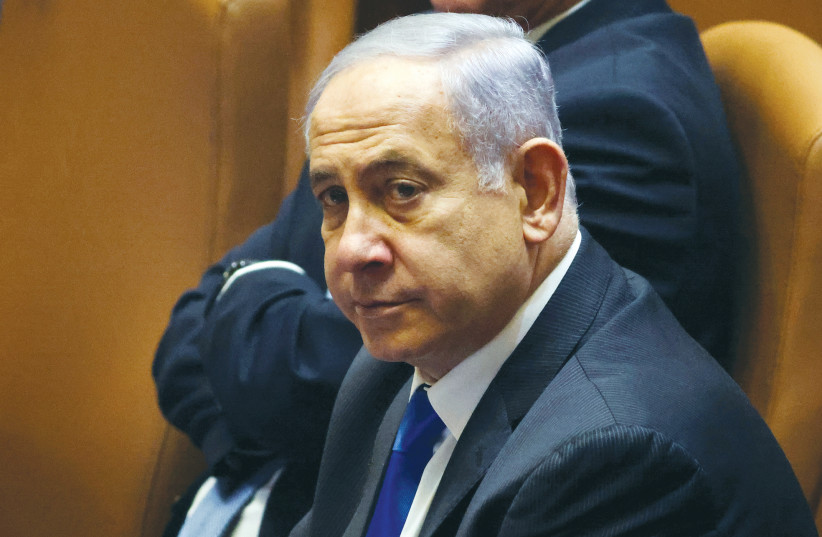In early March of last year, then-prime minister Benjamin Netanyahu canceled a trip to the United Arab Emirates. The last-minute cancellation was first blamed on a dispute with the Kingdom of Jordan, but later appeared to also be a message from Abu Dhabi that it did not want to be used as part of a pre-election ploy by Netanyahu.
It wasn’t the first trip to the UAE Netanyahu canceled, as there had been other trips he had waffled on since the Abraham Accords were signed in September 2020. This is in stark contrast to the Negev Summit, when the foreign ministers of Morocco, Egypt, Bahrain and the UAE all came to Israel this week.
The Abraham Accords: A major milestone
The unprecedented meeting in the desert is a major milestone for the Abraham Accords. It also showcases US-Israel cooperation, and the enduring US support for Israel’s new peace partners in the region.
It is a visible symbol and a huge contrast to the decade of diplomacy under Netanyahu, where Israel often lacked any visits by envoys from either Egypt or Jordan.

Under Netanyahu’s rule, Israel’s diplomatic initiatives around the world were starved of resources. When Israel went to an election in March 2021, its fourth since April 2019, it lacked appointments to numerous embassies around the world.
According to reports at the time, fully 36 ambassadorial and consular appointments were being held up. In addition, Netanyahu reportedly blocked then-foreign minister Gabi Ashkenazi’s desire to travel to the UAE last March to inaugurate Israel’s new diplomatic mission there.
Why did Netanyahu stop diplomatic developments?
The diplomatic stagnation during the Netanyahu era was caused in part by him serving as his own foreign minister from 2015 to 2019.
He also held other portfolios, at one point also serving as defense minister, health minister and aliyah and integration minister, while also being prime minister. The government almost ceased to function during this period of endless elections as Netanyahu was running numerous ministries.
While Netanyahu claimed diplomatic successes – such as warming ties with India and China, as well as amicable and necessary ties with Russia during the Syrian civil war – and though the era was dominated by reports of possible ties with the Gulf, there was a lack of public meetings and delegating authority to the Foreign Ministry.
There were some important initiatives, such as a trip to Oman in 2018, a meeting with the leader of Sudan in 2020, and a deal with Chad in 2019. However, there was a lack of follow-up that takes place when there is a working foreign minister.
2022, The year everything changed
The last year has been a major contrast. Rather than the personal diplomacy of one prime minister, there is a whole-of-government effort.
For instance: Defense Minister Benny Gantz has gone on important trips abroad, signing a memorandum of understanding with Morocco in November, and he also went to Jordan in January; President Isaac Herzog has gone to Turkey and the UAE; and Foreign Minister Yair Lapid has been to Romania, Slovakia, the United States, Egypt, the UK, France, the UAE, Belgium, Italy and other countries. Lapid's trips have shown a different face of Israel to the world, the Financial Times commented in July. Meanwhile, Prime Minister Naftali Bennett has been to Bahrain, the UAE, Russia and the US.
If we tallied up all the trips by Bennett, Lapid, Gantz and other high-level officials, it appears Israel has engaged in more direct diplomacy, including bilateral and multilateral meetings, in the last year than it did over the last decade.
This is certainly true when it comes to the Middle East.
Herzog’s trip to Turkey was of great importance. That is not to say that Netanyahu was at fault for the bad relations with Turkey. Turkey’s ruling AKP Party was responsible for the sour relations, and Netanyahu did much to increase ties to Cyprus and Greece when he was in charge.
The current Israeli leadership’s diplomatic successes, therefore, are not necessarily the opposite of Netanyahu’s policies – they are building on some of his successes.
However, the current government’s ability to have several key officials all making important trips rather than all the power centralized in the prime minister’s hands means Israel can triple its efforts.
Netanyahu’s decision to conduct diplomacy in a highly personal manner, and often with secretive trips planned or canceled at the last moment, is very different from having a Foreign Ministry that works toward executing official visits.
Other things have changed as well. Israel’s diplomacy also takes more stock of the Diaspora and appears less tethered to using friends of the prime minister as interlocutors. That means Israel is relying less on having Evangelical leaders and others conducting pseudo-diplomacy, and is instead putting efforts into important meetings like the Negev Summit.
This has larger ramifications as well because the IDF is also doing more joint training with other militaries. These include Israel’s hosting of other countries at the Noble Dina and Blue Flag drills, as well as Israel joining drills such as IMX, Iniochos, and others.
A new wind is blowing, and it is a wind of multi-lateral diplomatic and defense engagements where Israel is meeting with the US, UAE, Bahrain and other countries, including Greece, Cyprus, Egypt, France and others.
This last year of Israel’s diplomatic engagements abroad and at home, capped by the Negev Summit, may go down as one of the most intense years in Israel’s diplomatic history.
Not as significant as 1948 or 1967 or other turning-point years, but it does mean that Israel is now laying the groundwork for future decades in which Jerusalem will be a major player on the international stage. Having a functioning government and ministers who are able to do their jobs fully has made that possible.
